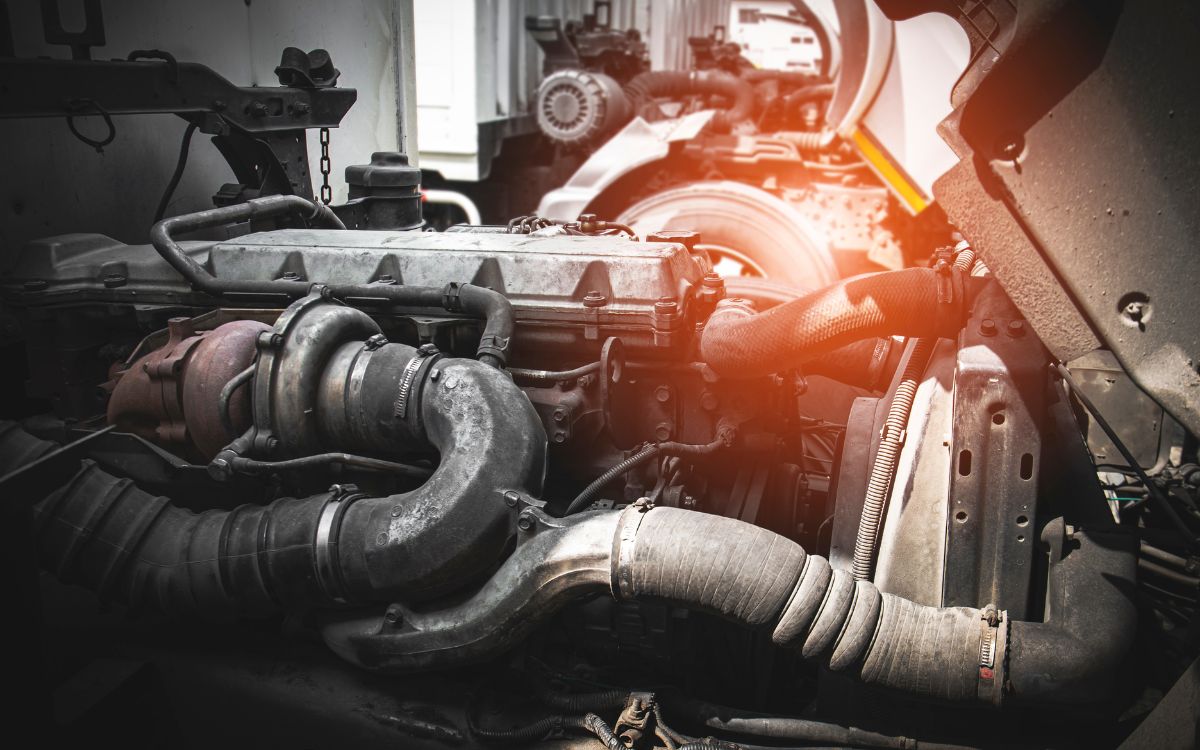The impact of Fort Worth summer weather on diesel engines can be a real scorcher.
In fact, when the mercury starts to rise, their #1 enemy is…the relentless Texas heat.
Many folks have NO idea how to combat it. But this knowledge separates the average driver from the diesel engine expert. If you don’t know how to protect your engine in extreme temperatures, you’ll never reach this level. Dealing with intense heat is tough, y’all.
Take for instance one trucker who recently told me that as soon as he hit a streak of 100-degree days… his rig overheated and left him stranded roadside.
Now he’s afraid to drive again during peak hours, not to mention scared about potential damage to his expensive diesel engine.

Health Risks Amid Intense Texas Heat
The intense summer heat in Fort Worth not only affects diesel engines but also poses significant health risks to commercial drivers. With the city potentially breaking records set during the hottest summer ever recorded back in 1980, these risks are more pertinent than ever.
This year’s extreme temperatures have resulted in MedStar responding to an alarming 118 emergencies related to excessive heat. Out of the 118 heat-related emergencies MedStar has responded to, a substantial amount – around 70 – necessitated hospitalization due to symptoms such as profuse perspiration, nausea and vomiting.
Preventive Measures for Drivers
In light of this escalating situation amid North Texas bringing highs back after spotty rain showers dropped temperatures late; it is vital that drivers take proactive measures seriously. Staying hydrated by drinking ample water throughout the day can help regulate body temperature and prevent dehydration caused by excess perspiration under scorching sun rays typical on a hot Dallas-Fort Worth day.
Besides hydration, seeking refuge from direct sunlight whenever possible provides much-needed respite from oppressive outdoor conditions. This could mean taking breaks inside air-conditioned buildings or finding shade under trees during rest periods.
The National Weather Service (NWS) offers useful tips on how best one can avoid succumbing to heat-related illnesses while working outdoors which would be particularly helpful for commercial truckers operating heavy-duty vehicles like diesel trucks amidst rising mercury levels across North Texas briefly touching record-breaking numbers seen previously over four decades ago.
Awareness plays a crucial role too when dealing with potential health hazards associated with extreme weather situations including high temps prevalent through most parts of summers around here. Recognizing early signs indicative towards imminent danger posed by overheating, such as unexplained fatigue or unusual thirstiness, allows timely intervention before they escalate into serious problems needing immediate medical attention.
Coping with Extreme Heat – Resources for Fort Worth Residents
When the summer season in Dallas-Fort Worth brings extreme heat, residents must be equipped to handle these conditions. Thankfully, there are several resources available that can make coping with high temperatures a little easier.
The following sections will guide you through some of the essential services provided by local authorities and how they can help during periods of intense Texas heat.
Community Action Partner Programs
In response to rising temperatures late into the North Texas summer days, The City of Fort Worth Neighborhood Services has established Community Action Partner Programs. To help those in need, the City of Fort Worth Neighborhood Services has implemented Community Action Partner Programs to improve living standards and foster self-sufficiency among low-income households. Learn more about these programs here.
Beyond community action efforts, specific measures have been put in place to tackle problems associated with severe weather conditions like our scorching summers.
HVAC Repair Assistance Program
A crucial part of surviving hot weather is having an efficient cooling system. With this understanding, city leaders warn residents about potential health risks amid intense Texas heat due to malfunctioning HVAC systems.
To counteract this issue, the Heating Ventilation and Air Conditioning (HVAC) Repair Assistance program was created. This initiative helps eligible homeowners repair or replace faulty HVAC units which could prove lifesaving when average morning low temp starts climbing rapidly towards single hottest temp records set back in 1980’s hottest summer ever recorded.
Facing Utility Bills Amid Summer’s 48 Days Of Intense Heat
Paying utility bills becomes increasingly challenging as consumption soars during peak usage times such as extremely hot months brought on by urban heat island effect causing spotty rain showers dropped temperatures briefly before bringing highs back up again later in day. In light of this challenge, Fort Worth offers assistance via its Comprehensive Energy Assistance Program (CEAP). This scheme aids struggling households meet their immediate energy needs while educating them on
Urban Heat Island Effect on Diesel Engines
The Urban Heat Island (UHI) effect is a phenomenon that significantly impacts diesel engines, particularly in the Fort Worth area. This occurs when urban areas heat up more than their rural surroundings due to human activities and infrastructure.
Diesel engines are designed to operate within specific temperature ranges for optimal performance and longevity. The intense heating caused by the UHI effect pushes these engines beyond their ideal operational conditions, leading to potential issues such as overheating or premature wear and tear.
Impact of Extreme Temperature Fluctuations
The rapid cooling followed by immediate reheating due to the UHI effect places additional strain on diesel engine components.These abrupt changes create thermal stress which can lead to metal fatigue and eventual failure if not properly managed.
- Increase fuel consumption rates because they force your vehicle’s cooling system work harder than usual.
- This increased workload leads directly decreased fuel efficiency – a critical concern any commercial driver mindful of operational costs. Studies .
Guarding Your Diesel Engine Against Fort Worth’s Intense Summer Heat
The summer season in Dallas-Fort Worth is known for its scorching temperatures. For commercial drivers, these extreme conditions can be particularly challenging as they put diesel engines at risk.
Maintenance Checks: A Preventive Measure
Routine inspections and maintenance checks are essential to keep your engine running smoothly during the hottest summer days. This includes checking belts for signs of wear or tear that could lead to overheating and ensuring the radiator is clean from debris which may restrict airflow causing a rise in engine temperature.
An oil change should also be part of this routine process since high-quality diesel oils help dissipate heat effectively while lubricating moving parts within the engine. APIa€™s guide on selecting appropriate motor oils offers valuable insights into choosing suitable options for your vehicle.
Coolant Levels: The Key To Temperature Management
In addition to regular maintenance checks, understanding coolant levels plays an integral role in managing your vehicle’s temperature amid intense Texas heat responses. Coolants absorb excess heat from the engine and release it through the radiator – a vital function especially when North Texas briefly experiences cooler weather before bringing highs back up again after spotty rain showers dropped temperatures late.
However, simply topping off isn’t enough; you need coolants designed specifically for diesel engines because they contain additives preventing rust formation inside metal components exposed constantly to water-based solutions like antifreeze fluids.
Remember: Overheated engines aren’t just inconvenient they are dangerous too. By adhering strictly towards preventive measures such as routine check-ups coupled with understanding coolant management basics will go long way ensuring safety reliability amidst Fort Worth’s single hottest temp records.
How Cooler Weather Can Impact Diesel Engines
The scorching heat of Dallas-Fort Worth’s summer season is known to challenge diesel engines, but what about when North Texas briefly experiences cooler weather? How does that impact your engine?
In essence, while the extreme heat poses its own set of challenges, we cannot overlook the effects of colder temperatures on diesel engines.
Diesel Gelling: A Cold Weather Phenomenon
‘Diesel gelling’ happens when lower temperatures cause wax in diesel fuel to solidify. This leads to clogged filters and injectors which can prevent an engine from starting or running efficiently.
- To combat this issue during spotty rain showers dropped temperatures periods; use winter-grade fuels with additives that lower freezing point of waxes present in diesel fuel.
- A block heater could be a worthy investment as it warms up engine oil before startup thus reducing strain on batteries and improving combustion efficiency at startup.
Battery Performance Under Colder Conditions
Cooler weather conditions might also negatively influence battery health leading towards hard starts or no start situations altogether if not taken care properly by professionals like those at Hawkeye Diesel Repair who will test for any signs wear tear whilst ensuring all connections are clean secure.
To maintain optimal tire pressure throughout these fluctuating late into north texas summer season ensure regular checks performed specialists know how handle such unpredictable circumstances here around dallas-fort worth area.
Maintaining Tire Pressure Amid Fluctuations
Despite fort worth leaders warn about dangers high temp single hottest day ever recorded back 1980 recent news afternoon update has reported significant drops temps causing change tire pressures too.
Therefore whether you’re dealing intense texas heat experiencing some relief due cooling robs dallas its typical hot climate remember both extremes pose unique sets risks need attention preparation order keep vehicle road-ready regardless forecasted highs lows ahead us.
Impact of Fort Worth Summer Weather on Diesel Engines
Explore the impact of Fort Worth summer weather on diesel engines. Learn tips to protect your engine and stay safe amid Texas heatwaves.
Preparing For The Hottest Summer Days Ahead
The summer season in Dallas-Fort Worth is gearing up to potentially break the single hottest temperature record set back in 1980. As commercial drivers, this means drought conditions for your diesel engines if not adequately prepared.
In short, taking proactive steps now will ensure smooth operation amid these challenging weather conditions.
Maintaining Optimal Coolant Levels Amidst Intense Heat
Coolants are essentially the lifeblood of an engine during Fort Worth’s heating period. They absorb excess heat and dissipate it through the radiator – crucial during high-temperature periods like North Texas bringing highs back after spotty rain showers dropped temperatures late in the day.
- A regular check on coolant levels ensures they don’t drop too low or become contaminated with rust or debris, which would reduce their effectiveness at cooling down your engine.
- If necessary, top off coolant reservoirs regularly as part of routine maintenance checks.
- This simple step goes a long way towards preventing mechanical issues such as leaks that could escalate into major repairs later on.
Parking Practices During Extreme Heat Conditions
Diesel vehicles parked under direct sunlight face additional stressors beyond just ambient temperatures – think urban heat island effect compounded by solar gain inside cabins when left outdoors for extended periods. Here’s what NHTSA suggests about protecting vehicles against excessive sun exposure among other things:
- Finding shaded areas whenever possible helps keep internal cabin temperatures lower, thus reducing the load on air conditioning systems and the overall powertrain system, including its diesel engine.
- Using reflective window covers also reduces solar gain significantly when the vehicle has to be parked outside over prolonged durations.

Conclusion
The sweltering summer heat in Fort Worth can be a silent enemy to diesel engines, causing mechanical issues that could potentially lead to breakdowns.
Commercial drivers are not just battling with engine troubles but also health risks from the intense Texas heat. However, there are preventive measures and resources available for both these challenges.
Beyond the scorching sun, urban heat islands further intensify the temperature effect on engines. Yet, it’s not all about the heat – even cooler weather can impact diesel performance negatively if unprepared.
Protective steps like regular maintenance checks and maintaining proper coolant levels can help safeguard your diesel engine against extreme temperatures.
At Hawkeye Diesel Repair we understand how critical your vehicle is to you especially during challenging weather conditions. Our team of experts is here to ensure your diesel engine stays reliable through every season. Visit us at Hawkeye Diesel Repair, where we’re ready to provide top-notch solutions tailored specifically for your needs amidst Fort Worth’s fluctuating climate patterns.





